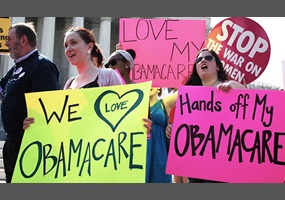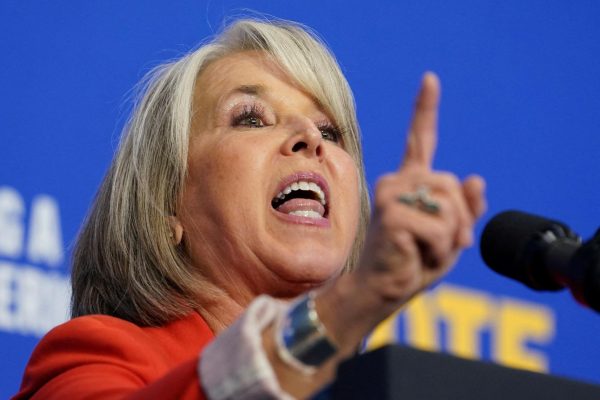The Aftermath of ACA Repeal Remains Uncertain

As the GOP continues to promise repeal of the ACA (Obamacare), many citizens are voicing their displeasure.
When the Patient Protection and Affordable Care Act (ACA) or “Obamacare” was signed into law by President Barack Obama in March 2010, much of our country thought we had finally found a way to ensure that “everybody should have some basic security when it comes to their healthcare.” At least, that is what Obama stated at the signing of the widely anticipated bill.
With the major tenets of the ACA going into effect on January 1, 2014, the intent of the law was to make sure that health insurance was made available to the more than 30 million Americans who had no health insurance. This was to be done by expanding government and state funded insurance and by providing federal grants to help lower and middle income American citizens buy private health insurance.
With President Donald Trump and the Republican-controlled Congress chomping at the bit to do away with “Obamacare,” it may be a good time to take a closer look at what the country may be losing and ask what will happen if the ACA is repealed.
First, we must analyze the history of health insurance in the United States. Many times in our country’s history, efforts were made to have some type of “universal government-funded health care.” Many other countries already have some sort of social insurance, so why wasn’t it made available in the United States?
As far back as the late 1800’s through 1912, the federal government took no action to make health insurance mandatory: that was pretty much left up to the individual states. In turn, the states left the matter to private companies and voluntary programs. When President Theodore Roosevelt took office in 1901, he did favor universal health insurance, as he believed a country couldn’t be strong if its people were sick and poor. Nevertheless, not much was done with regards to health insurance during this time.
There wasn’t really anything accomplished in terms of national health insurance for many, many years. After WWII, private insurance groups made sure that people in the United States that were powerful and influential were taken care of. It wasn’t until July 30, 1965, that President Lyndon B. Johnson signed Medicare and Medicaid into law. Medicare was made available to all United States citizens 65 years and older and to those with specific disabilities. It was funded through payroll taxes.
Medicaid was designed to provide low income people and families with health care coverage. It was funded by the Federal and State governments. But, what about those people under 65 who don’t have insurance through their employment or couldn’t afford to purchase health insurance privately? All of these citizens were left without any type of medical insurance.
Flash forward to 2009. Obama had made health insurance a cornerstone of his presidential campaign. In July 2009, the House Democrats introduced a 1,000-page plan that aimed to repair the health care system. Immediately, critics expressed a multitude of concerns. In order to quell the discontent, it was pointed out that “nothing in this act or anywhere in this bill forces anyone to change the insurance they have, period.” The ACA became law after going through many revisions.
Roughly 6.1 million people, many of them young adults between the ages of 19 and 25, were finally able to get insurance. The ACA changed the way that the insurance market works for the individual and also expanded Medicaid, which targets low income citizens. It also decreased Medicare premiums for senior citizens, provided free contraceptives and mammograms for women, and some types of restaurants must now post a calorie count of items on their menu. Despite some of the positive outcomes of the ACA, there has also been a lot of controversy. Many argue that it has ruined the healthcare system, increased individual healthcare premiums to ridiculous levels, and millions of people are still uninsured.
When the 115th session of Congress began this year, one of the first items on their agenda was to begin the process of repealing the ACA. Of course, this will not happen overnight, even though Trump – who at the beginning of the primary season was opposed to repeal, favoring revision – promised repeal on Day One of his administration after he realized he could not win the GOP nomination without walking back his original position.
On Friday, January 13, the House approved a measure that would prevent Senate Democrats from obstructing a future bill to repeal and replace the ACA. So, what would this mean to the average middle-class citizen? Insurance-wise, probably not much. However, on a larger scale, those who fall into the low income bracket or people who have preexisting medical conditions would find it more difficult to obtain health care coverage.
Additionally, the government subsidies for insurance would be eliminated and people would have to pay the full cost of their health insurance. This would lower the burden on taxpayers. Other than California, Florida has the most government subsidies for health care; consequently, Florida could potentially lose billions of dollars if and when the ACA is repealed.
However, repeal of the ACA would mean that up to three million middle-class health care workers will lose their jobs. Simply put, if the ACA is repealed, 20 million people will lose their healthcare resulting in the flow of funds between hospitals, doctors, pharmacies being drastically affected in a very negative manner.
More recently, however, it looks as if the ACA won’t be going away as soon as many may have hoped. What the future holds is anyone’s guess. Even with the newly-elected Republican controlled Congress having already begun the process of repeal, on Sunday, February 5, Trump and the GOP leadership suggested it could be well into 2018 before they can come up a suitable replacement for the ACA.
As a result, for the many who depend on some sort of governmental assistance for healthcare insurance, the only thing that is certain is that the future of their healthcare insurance is uncertain.














